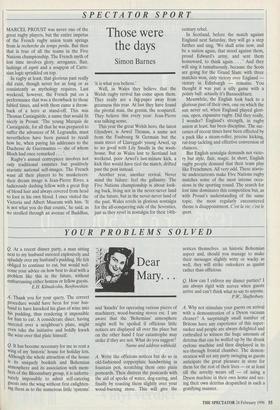SPECTATOR SPORT
Those were the days
Simon Barnes
MARCEL PROUST was never one of the great rugby players, but the entire impetus of the French rugby union team springs from la recherche du temps perdu. But then that is true of all the teams in the Five Nations championship. The French myth of lost time involves glory, arrogance, flair, lashings of esprit and a soupgon of Carte- sian logic sprinkled on top.
In rugby at least, that glorious past really did exist, though never for as long or as consistently as mythology requires. Last weekend, however, the French put on a performance that was a throwback to those fabled times, and with them came a throw- back of a hero at stand-off. This was Thomas Castaignede, a name that would fit nicely in Proust: 'The young Marquis de Castaignede, for all that he was prepared to suffer the advances of M. Legrandin, must nevertheless have been pained to recall how he, when paying his addresses to the Duchesse de Guermantes — she of whom Bloch had once remarked . . .
Rugby's annual centrepiece involves not only traditional enmities but positively atavistic national self-images. The French want all their players to be musketeers: their dream image is Jean-Pierre Rives, a ludicrously dashing fellow with a great flop of blond hair and always covered from head to foot in his own blood. I once visited the Victoria and Albert Museum with him. 'It is not what you do that counts,' he said, as we strolled through an avenue of Buddhas, `it is what you believe.'
Well, in Wales they believe that the Welsh rugby revival has come upon them. They really are a fag-paper away from greatness this year. At last they have found the pivotal man, the genius, the nonpareil. They believe this every year: Jean-Pierre was talking sense.
This year the great Welsh hero, the latest Glyndywr, is Arwel Thomas, a name not from the Faubourg St Germain but the main street of Llareggub: young Arwel, up to no good with Lily Smalls in the wash- house. But as Wales lost to Scotland last weekend, poor Arwel's last-minute kick, a kick that would have tied the match, drifted past the post instead.
Another year, another revival. Never mind the failure: feel the gallantry. The Five Nations championship is about look- ing back, living not in the never-never land of the future, but in the never-never land of the past. Wales revels in glorious nostalgia for the all-conquering side of the Seventies, just as they revel in nostalgia for their 14th- century rebel.
In Scotland, before the match against England next Saturday, they will go a step further and sing, 'We shall arise now, and be a nation again, that stood against them, proud Edward's army, and sent them homeward, to think again. . . . ' And they will sing it tumultuously, because the Scots are going for the Grand Slam: with three matches won, only victory over England victory in Edinburgh — remains. You thought it was just a silly game with a pointy ball: actually it's Bannockburn.
Meanwhile, the English look back to a glorious past of their own, one on which the sun never set, when England played glori- ous, open, expansive rugby. Did they really, I wonder? England's strength, in rugby union at least, has been discipline. The suc- cesses of recent times have been effected by a pack like a steam-roller, precise kicking, rat-trap tackling and effective conversion of chances.
But English nostalgia demands not victo- ry but style, flair, magic. In short, English rugby people demand that their team play like Frenchmen. All very odd. These atavis- tic undercurrents make Five Nations rugby matches some of the most intense occa- sions in the sporting round. The search for lost time dominates this competition but, as with Proust's understanding of the same topic, the most regularly encountered theme is disappointment. C'est la vie; c'est le sport.


























































 Previous page
Previous page